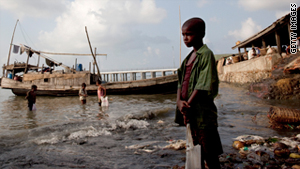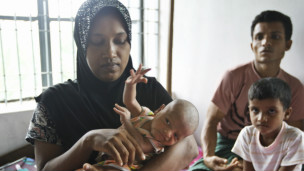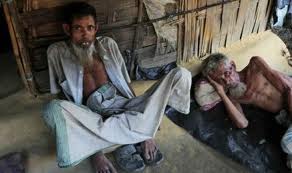[Indonesia Report] Indonesians condemn violence in Rakhine

Ethnic Rohingya boat people from Burma sit at Malahayati harbour after they were rescued in the Indonesia's Aceh province on February 16, 2011. (Photo: www.hrw.org)
Rohingya – Rakhine conflict in Myanmar has been going on for the past two months. According to Amnesty International, Myanmar’s National Human Rights Commission on July 11 reported at least 78 people have been killed, but unofficial estimates exceed 100.
Around 50.000 – 90.000 people has been displaced.
Due to the conflict, many of the Rohingyas flee Myanmar to seek for asylum.
Last week, twenty-three of Rohingya refugees from Myanmar escaped from a hostel used as temporary immigration detention facility in Bogor, Indonesia, according to Indonesian Directorate of Immigration’s spokesperson, Maryoto Sumadi, BBC reported.
According to Indonesian Foreign Ministry record, 394 Rohingyas have sought asylum in Indonesia. 124 people are ready to be resettled in the third party countries and the rest are still sheltered in some of Indonesian Immigration detention facilities, The Jakarta Post reported.
Rohingya refugees seek for asylum to Bangladesh and Australia. They came to Indonesia as a transit country before they go to Australia as their final destination.
The conflict between Muslim Rohingya and Budhist Rakhine has sparked allegation of human rights violations by Myanmar authority.
Indonesian raises concern over human rights issue on the conflict in western Burmese state of Rakhine. Demonstrations were held by students and human rights activists in Indonesia to condemn violence towards Rohingyas.

A Rohingya boy waits for a fishing boat to come in so he can make small money carrying the fish to shore on May 5, 2009 in Sittwe, Arakan state, Myanmar. (Photo: CNN.com)
Marty Natalegawa, Indonesian Foreign Minister told Jakarta Post, Indonesian prominent mass media, “We must highlight, again, that Indonesia has consistently rejected discrimination based on religion, ethnicity, or any other reason. Our stance also applies to the ongoing attacks against the Rohingya in Myanmar.”
Myanmar’s Ministry of Foreign Affairs in its press release denies any allegation of human rights violations done by Myanmar’s security forces.
“As such, Myanmar strongly rejects the accusations made by some quarters that abuses and excessive use of force were made by the authorities in dealing with the situation.”
Amnesty International claims that they received credible reports of human rights abuses towards Rohingyas and other Rakhine Muslims by Budhist Rakhine and Myanmar’s security forces.

A Rohingya mother holds her baby. Rohingya fled to Indonesia and other countries to escapes from violence in Myanmar. (Photo: BBC.co.uk/indonesia/)
Myanmar’s government denies the accusation of religious reason as the cause behind the conflict in Rakhine state, saying that
“Peace and stability is indispensable for the on-going democratization and reform process in Myanmar. National solidarity and racial harmony among different nationalities is vital for the perpetuation of the Union. Myanmar is a multi-religious country where Buddhists, Christians, Muslims and Hindus have been living together in peace and harmony for centuries, hence those recent incidents occurred in the Rakhine State are neither because of religious oppression nor discrimination.”
The conflict provoked by an incident of a Buddhist Rakhine woman, who was raped, robbed and killed by three Muslim Rohangiyas men in Yanbye Township on 28 May this year. Then followed by murder of ten Muslim Rohingya men in a passenger bus in Taungup Township on June 3.
Two of the assailants receives death sentence and one other hanged himself while in detention, the government-run newspaper New Light of Myanmar reported on its website.
Rohingya are stateless Muslims from northern Rakhine state in Myanmar. Rohingya has been living in Myanmar for generations. According to United Nations, Myanmar has the largest population of Rohingya in the world with around 800.000 people. Myanmar government regards Rohingyas as illegal migrants from Bangladesh, while Bangladesh refuses to recognize them.
In 2009, hundreds of Rohanigyas fled from Myanmar and were intercepted in Thai waters and forced back to sea. Hundreds are believed to have drowned.
Meidyana Rayana Intern Reporter news@theasian.asia













































































